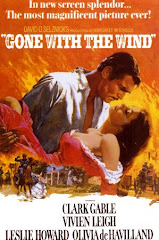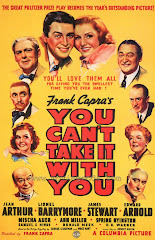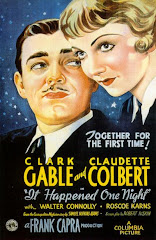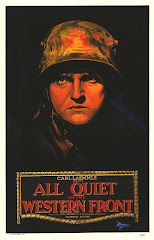Cast: Laurence Olivier, Joan Fontaine, George Sanders, Judith Anderson
Genre: Drama, Romance, Thriller, Mystery
Other Nominees: All This and Heaven Too, Foreign Correspondent, The Grapes of Wrath, The Great Dictator, Kitty Foyle, The Letter, The Long Voyage Home, Our Town, The Philadelphia Story
“Last night, I dreamt I went to Manderley again. I stood by the iron gate leading to the drive, and for a while I could not enter for the way was barred to me. Then, like all dreamers, I was possessed of a sudden with supernatural powers and passed like a spirit through the barrier before me..”
What a great opening to a film! I defy anyone to watch this opening scene and not be hooked. The narrator who speaks these lines is the second Mrs. de Winter, lady of this house, and as she tells us of her dream we see it with out own eyes on screen. The camera takes us through the iron gate and down a twisting driveway overgrown with brush and weeds. The fog thickens for some time increasing the eeriness and when it clears standing before us are the ghostly ruins of Manderley, a great estate house in Southern England. In her dream the moon plays tricks on Mrs. de Winter and various rooms appear to be lit up and inhabited. But then the moon passes behind a cloud and the house returns to its dead, lifeless state.
There is a strong element of the supernatural that plays throughout this film and it is born in this opening scene. The vision of the decayed house at the beginning fills us with a sense of foreboding. Rebecca is a film that cannot easily be classified as any one genre. It is at its heart a romance, and yet prominently a psychological thriller, and even at times an outright horror film, and with a dash of mystery thrown in for good measure. Starting right from this opening scene there is a very real undercurrent of dread that runs throughout and I spent the movie anxiously waiting for the big reveal, for the twist or the shock to come. I was not disappointed.
So who is Rebecca? What is fascinating about this film is that we never meet it’s namesake in person or otherwise. The original lady of the house never makes her appearance on screen, nor do we meet her in anyone’s dreams or memories. There are also no photos or portraits of her to be found hanging on the walls of Maderley. And yet despite this there is no question that Rebecca de Winter is the main character of this film. She is a ghost in the lives of the characters who remain at the house and she haunts them in a very real sense. It is an amazing experience to watch a film whose main character is off screen and whose influence is felt in every scene you watch and in every characters’ actions and words.
The first act of the film takes place in Monte Carlo, Southern France. An obnoxious wealthy lady is staying at a plush hotel with her mild mannered handmaid, brilliantly played by Joan Fontaine, when she spots the dashing Maxim de Winter, played by the equally excellent Laurence Olivier. Through conversations that ensue we learn that Maxim is a widower and that his late wife, Rebecca de Winter, died when her boat capsized near her home. Early on we are made aware of two things. One, that Rebecca was loved by everyone and regarded by most as the perfect wife and lady. Two, we are made aware of the brooding nature of Maxim and continually reminded of his outbursts and proneness to anger. Indeed Maxim is not the most debonair of men and his meeting of, courtship of, and proposal to the handmaid is as unnatural and strange as his behavior.
Maxim de Winter: I'm asking you to marry me, you little fool.
As I watched the credits roll I was shocked with the realization that we never learn the name of our heroine. She goes from being a timid and unimportant handmaid to being the Second Mrs. De Winter and despite all of her time spent on screen we never learn her name. I loved this about the film and it is right up Hitchcock’s alley! The fact is that the former Rebecca de Winters’ name is very prominent throughout the movie, everyone talks about her constantly, and her initials are embroidered or emblazoned everywhere. Indeed the final shot of the film is a close-up of her embroidered initials on a pillowcase. Our heroine is not only considered a poor substitute for the late, great Rebecca in appearance and character, but she is apparently not important enough to warrant being named and instead must bare the symbolically derogatory title of the Second Mrs. De Winter.
When the Second Mrs. De Winter arrives with her husband at Manderley she finds a staff whose loyalty to Rebecca is cemented in their actions. They are not very welcoming of their new mistress to say the least. The running of the house is ordered by a Mrs. Danvers, chillingly portrayed by Judith Anderson. Mrs. Danvers is the extreme example of someone who is devoted to Rebecca and who cannot accept the new Mrs. de Winters. In a way as she orders the running of the house she keeps her former employer very much alive, as things are always done and kept how Rebecca wanted them. “Danny” is cold and hostile towards her new mistress from the moment she enters the house and the relationship only deteriorates as the movie progresses.
Mrs. Danvers: You thought you could be Mrs. de Winter, live in her house, walk in her steps, take the things that were hers! But she's too strong for you.
The character of Mrs. Danvers is also interesting as she represents one of the major changes made between the novel and its screen adaption. In the novel she was an older woman and a mother figure to Rebecca. In the movie Hitchcock made her a younger woman whose infatuation with her employee is passionate and emotional. It has been commented on that in a time when homosexuality was a social taboo here is clearly a lesbian character in a successful major Hollywood production. And while there is no outright comment made there are also questions raised as to the sexual orientation of Rebecca and their relationship together. The censors at the time left these insinuations intact probably because they could not prove that these women were lesbians.
The house itself plays a huge role in this film. Manderley is impressive, intimidating, gloomy, and beautiful. The film does a great job of remaining grounded in reality, and while never completely crossing over into supernatural territory, the intimidating and gloomy atmosphere found in the house makes for some creepy and frightening scenes. As the new Mrs. de Winter explores the house she is accompanied by a building crescendo of a soundtrack and I cannot help but think of the Overlook Hotel in Kubrick’s The Shining. I imagine this film could have easily been a strong inspiration for Kubrick as it shares similar themes. Both have a heroine who finds herself in an enormous and unfriendly environment that she does not comprehend but is forced to stand up to.
I will leave the rest of the movie shrouded in mystery just as the motives of the house staff and the natures of both the late Mrs. de Winter and Maxim de Winter are mysterious. There are revelations to be revealed at Manderley and hidden secrets to be discovered and I do not want to spoil the experience of this haunting film for you. If this has not convinced you to see Rebecca then note that this film is Alfred Hitchcock’s only Best Picture Oscar winner. I think this fact should be reason enough for you to see it.
Next up: How Green Was My Valley


















































